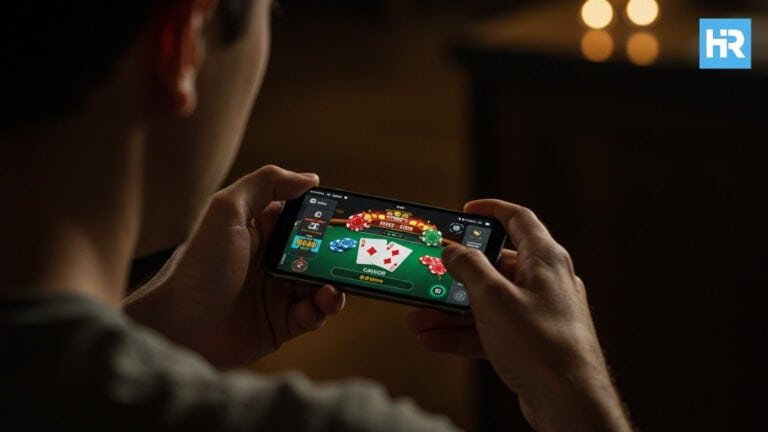
In New Jersey, the clatter of chips and the buzz of slot machines haven’t disappeared, but they’re no longer the whole story. These days, the real action happens in the palm of your hand. From high-rises in Jersey City to parked cars outside Wawa, players are logging into mobile casinos instead of lining up at tables. Atlantic City still draws crowds, but the casino floor has gone portable.
This shift isn’t subtle. It’s a full-blown redefinition of how and where people gamble. The rise of mobile-first casinos, apps designed specifically for the mobile experience, not just repackaged desktop sites, has made gaming faster, more personal, and wildly more accessible.
You don’t need a hotel room and a comped drink to place a bet anymore. You just need a decent Wi-Fi signal.
New Jersey saw this coming. Long before other states caught on, it was already investing in the infrastructure, regulation, and partnerships needed to support a thriving mobile casino industry. Now, it’s not just riding the wave: it’s steering it.
The Rise of Mobile Gambling
If you thought online gambling in New Jersey had peaked, think again. April 2025 saw internet gaming revenue in the Garden State hit $235.2 million, a staggering 25.2% jump from the same time last year. To put it in perspective, that’s nearly half of the state’s total gaming revenue for the month ($536.6 million), according to data from the New Jersey Division of Gaming Enforcement. And this isn’t a blip. It’s the new normal.
Zoom out a bit, and the trend becomes even clearer. In 2024, online casino games alone (slots and table games, not sports betting), raked in $2.36 billion across New Jersey. That’s a 24.5% increase over the previous year. The days when online gambling was a niche side business are gone. Now, it’s the front door, the lobby, and most of the house.
Leading the charge are the big-name operators, all of whom have invested heavily in mobile-first experiences. These aren’t just desktop sites adapted for phones. We’re talking slick, purpose-built apps with biometric logins, personalized promos, and game lobbies that load faster than you can say “Blackjack.” Players aren’t waiting until they get home, they’re placing bets on the subway, during lunch breaks, or while waiting for their kid’s soccer game to end.
Why the shift? Convenience is the obvious answer, but it’s not the whole story. There’s a generational handoff happening. Younger gamblers aren’t interested in driving to Atlantic City for a night out when the same experience, plus a welcome bonus and zero lines, fits in their pocket. Mobile gambling isn’t just rising. It’s becoming the default.
Why Players Are Choosing Apps Over the Web
Somewhere between the moment you click “Accept Cookies” and the tenth pop-up that hijacks your screen, the magic of browser gambling fades. In New Jersey, players are waking up to that reality and responding with a simple solution: they’re going all-in on apps.
This isn’t just about preference. It’s about performance, speed, and the way online mobile casinos have evolved into intuitive, high-stakes playgrounds. Whether it’s poker on the bus or blackjack in bed, the best mobile casino experience is no longer in your browser. It’s in your pocket.
Seamless User Experience
Mobile browsers weren’t designed for adrenaline. They buffer. They crash mid-spin. They demand patience, something gamblers have in short supply when the stakes are hot. Meanwhile, mobile casino apps are fluid, fast, and frictionless. The design is tighter. The transitions are smoother. And most importantly, the wins feel closer.
Biometric logins (like Face ID and fingerprint access) on apps offered by popular operators remove the hassle of repeated logins. Want to deposit? Two taps. Want to switch from roulette to video poker? You’re there in seconds. When your competition is milliseconds away, this matters.
Enhanced Engagement and Retention
Here’s the part browser-based sites can’t match: presence. Once you download an app, it lives with you. It sends notifications. It whispers about bonuses and tournaments while you’re checking the weather. It’s there when boredom strikes before you even open a tab.
Apps aren’t just more available, they’re more personal. Platforms have leaned into this, rolling out tools like “My Spend” that track and display your betting habits. Apps report that nearly half of their users have engaged with that feature, showing how the best mobile casinos don’t just want your attention, but they want to earn your trust as well.
Exclusive Mobile Promotions
In the race to offer the best mobile casino experience, promotions are a secret weapon. And many of the most generous offers? They’re mobile-only. Think of risk-free bets, boosted odds, or deposit matches that only show up once you’ve downloaded the app.
This isn’t just a gimmick. Operators know that once a player downloads the app, the odds of them returning skyrocket, so they reward that loyalty with app-specific perks.
Catering to Digital Natives
If you’re under 35, you’re probably not clicking around a desktop site to play baccarat. You’re tapping, swiping, and streaming everything, from Netflix to slot spins, on your phone. And online mobile casinos have taken note.
The best mobile casinos have adapted to mimic the feel of social media: swipeable lobbies, push notifications, and real-time chats with support or other players. For digital natives, it’s not just a convenience thing, it’s cultural. If it doesn’t fit into a mobile lifestyle, it doesn’t get used. It’s as simple as that.
Regulatory Support and Security
It’s one thing to build a beautiful app, it’s another to earn player trust. That’s where New Jersey’s Division of Gaming Enforcement comes in. They’ve laid out clear, rigorous standards that every legal mobile casino must follow. We’re talking encrypted payments, transparent odds, and built-in tools to prevent gambling harm.
This security net makes a real difference, especially for players who are cautious about gambling online. Knowing that the app is licensed, audited, and overseen by a regulatory body makes users more likely to download and stay. That trust? It’s part of what separates the best mobile casino experiences from the rest.
App Culture Is Here to Stay
So what does all this add up to? A cultural shift. Not just in how people gamble, but also in how they expect to interact with digital experiences. Mobile apps aren’t a sidekick to the browser anymore, they’re the main character. And in New Jersey, players have made their choice.
Will browsers disappear entirely? Probably not. But for anyone serious about seamless gaming, fast access, and exclusive rewards, the message is loud and clear: the future of online mobile casinos is in the app store.
The Technology Powering Mobile Casinos
The next time you tap into a mobile casino app, take a moment, because what’s happening behind that clean interface is anything but simple. What looks like a quick login and a few spins is actually a finely tuned system of security checks, real-time analytics, and geo-verification working together in the background. And it all happens in seconds.
New Jersey didn’t build its thriving mobile gambling scene on luck; it built it on infrastructure. From day one, regulators and developers knew that the future of mobile phone casino gaming had to be seamless and safe. That meant investing in tools that could do what dealers and pit bosses once handled: verify who you are, where you are, and whether you’re playing by the rules.
Geolocation: Ensuring Legal Play
Geolocation isn’t optional, it’s the gatekeeper. If you’re not physically inside New Jersey (or another legalized state), you’re not getting in.
These apps cross-reference GPS, Wi-Fi signals, and your IP address before even letting you load a game. The tech has come a long way since 2013, when users just over the border would get bounced for no good reason. Now? It’s precise, silent, and essential.
Biometric Authentication: Enhancing Security
Passwords are out. Biometrics are in. Whether it’s a fingerprint or Face ID, casino mobile apps now use biometric authentication to keep your account locked down and make logging in frictionless. It’s one of those features you don’t think about until you use it. Then, you never want to go back. Fast, secure, and less prone to human error, it’s the industry’s quiet MVP.
Push Notifications: Personalized Engagement
There was a time when push notifications felt like digital hecklers, constant, irrelevant, and always interrupting dinner. Today’s smarter mobile casinos have dialed it in. They now use player behavior to time their messages. If you’ve just logged out, they’ll wait. If you’re active on Wednesdays, guess when you’ll get your bonus alert? It’s not mind-reading, it’s good data.
Real-Time Analytics: Tailoring the Experience
Real-time analytics is where things get personal. The more you play, the more your app learns. Not just what games you like, but how long you stay, when you take breaks, and even how you bet. This isn’t surveillance, it’s service.
The best mobile casino platforms use that data to tailor your experience, whether suggesting new games or adjusting promo offers. It’s like having a concierge, only faster.
Why Mobile-First Matters: The Shift in User Behavior
Scroll through any New Jersey casino app’s analytics dashboard, and a clear pattern emerges: the desktop crowd is shrinking, fast. Today’s gamblers (especially the under-40 crowd) aren’t logging in from their laptops after dinner. They’re tapping into blackjack on the train, placing a bet while waiting for coffee, spinning the slots from bed. Mobile-first isn’t a trend anymore. It’s the baseline.
The change isn’t just about screen size. It’s about expectations. Today’s users demand speed, personalization, and zero friction. A clunky interface or lagging load time isn’t just annoying, it’s a dealbreaker. If your casino app can’t deliver immediacy, it won’t even make it to the second swipe.
Younger Gamblers Expect Mobile by Default
For Gen Z and younger millennials, the idea of downloading a desktop client or navigating a casino’s website through a browser feels like stepping into the past. These users grew up with smartphones, and their digital instincts are shaped by apps, not web forms. They want games that load in seconds, payment methods that sync with Apple Pay, and interfaces that behave like Instagram, not Internet Explorer.
The shift to mobile-first isn’t just aesthetic. It’s functional. Native apps allow operators to create personalized dashboards, serve dynamic promotions, and optimize every pixel for conversion. Browsers can’t match that agility. That’s why mobile-first casinos see longer session times and higher average revenue per user.
Push notifications, location-based bonuses, and AI-driven game suggestions are now standard. If your app doesn’t know your user, someone else’s will. And that someone else? They’re one tap away in the App Store.
It’s Not Just Mobile-Optimized. It’s Mobile-Obsessed.
There’s a difference between making your casino work on mobile and designing for mobile from the start. The latter means embracing vertical video, thumb-friendly navigation, and instant game switching. It means rethinking UX from the ground up, not cramming a desktop design onto a smaller screen.
The best-performing mobile casinos in New Jersey aren’t just mobile-accessible. They’re mobile-first, down to the code, and users can feel the difference.
Impact on Traditional Casinos
It’s not that gamblers have stopped visiting Atlantic City. The slot machines are still humming, and poker tables still fill up on weekends.
But there’s no denying it: foot traffic isn’t what it used to be. In April 2025, in-person casino revenue in New Jersey slipped 2.7% compared to the same month last year. It might seem like a small drop, but in a business built on margins and momentum, it’s the kind of number that raises eyebrows and boardroom alarms.
The shift isn’t dramatic. It’s incremental. And that’s what makes it dangerous. Gamblers haven’t abandoned physical casinos altogether; they’ve just started showing up less often, staying for shorter periods, and spending more time on their phones.
What once required a night out—parking, lines, tables, noise—now lives in an app, available 24/7, minus the dress code. In short, the bar for “convenience” has moved, and traditional casinos are racing to catch up.
Some operators have taken the hint. Instead of resisting the digital wave, they’re learning to ride it. Some casinos are investing in companion apps, remote loyalty programs, and digital wallet integration, blending the best of both worlds. Others are experimenting with hybrid experiences: in-person poker tournaments that tie into online qualifiers or sports betting lounges with app-only perks and second-screen features. It’s not just innovation, it’s survival.
Still, adaptation isn’t universal. Smaller properties, especially those without major digital infrastructure, are feeling the squeeze. They rely heavily on in-person events, buffet traffic, and walk-ins, segments now undercut by mobile convenience. The question isn’t whether physical casinos will survive but whether they can evolve fast enough to stay culturally relevant. Players, especially younger ones, are becoming harder to impress with just neon lights and free drinks.
In a way, it’s not a decline. It’s a recalibration. The idea of what a “casino” is—and where it lives, is changing. The house isn’t just a building anymore. It’s an ecosystem. And for the old guard, the future won’t be won with bigger buildings but smarter connections. The winners will be the ones who meet players where they already are: online, on their phones, and expecting more.
How New Jersey Became a Mobile Gaming Hub
New Jersey didn’t stumble into dominance; it sprinted ahead while most other states still argued about whether online gambling was worth the risk. It didn’t just open the door to mobile casinos; it knocked down the whole wall.
By legalizing online gaming early and backing it up with one of the most robust regulatory systems in the country, the state turned a gamble into a long-term play and won big.
They Didn’t Wait for Permission
Back in 2013, when most of the country was still wringing its hands about the morality of online gambling, New Jersey said: let’s regulate it and make it work. Then-Governor Chris Christie signed legislation that year, and by November, the first licensed platforms were live. It wasn’t perfect out of the gate, but it was fast, deliberate, and ambitious. And it gave the state a massive first-mover advantage.
Tech Headaches and Bank Blockades
Of course, early adopters take the hits first. At launch, geolocation tools were buggy, kicking out players sitting squarely within New Jersey borders. Banks, still wary of federal pressure, rejected thousands of perfectly legal transactions.
But instead of backing off, regulators leaned in. They worked with banks to create custom merchant codes and pushed tech providers to refine their tools. Within a year, approval rates jumped, and complaints dropped.
Regulators Who Knew the Game
Here’s where Jersey really pulled ahead: enforcement. The Division of Gaming Enforcement, led by David Rebuck, didn’t just act as a watchdog, it acted as a partner. Their approach balanced oversight with collaboration, setting clear expectations while giving operators space to innovate. This steady hand reassured both consumers and major platforms that the market was safe, serious, and built to last.
Billions Later, The Bet Paid Off
Fast-forward to 2024, and the numbers tell the story: $6.3 billion in total gambling revenue, with a huge chunk of that coming from online and mobile phone casino play. What started as a bold experiment is now a national benchmark. The convenience, speed, and personalization of casino mobile platforms are drawing more players by the month, and they’re sticking around.
The Atlantic City Dilemma: Adapting to a Mobile-First World
There’s something almost cinematic about Atlantic City, its neon glow, the clang of coins hitting trays, the echo of cheers from a roulette win. But behind that familiar soundtrack, a quieter revolution is taking place.
More players now walk the casino floor with a phone in hand, tapping into mobile online casinos even while surrounded by the real thing. Atlantic City isn’t dying, it’s evolving. But it has a decision to make: adapt or become a backdrop to its own obsolescence.
The smartest casinos aren’t resisting the shift, they’re folding it into their strategy. Many of them have started syncing their in-person experiences with mobile apps, letting players track loyalty points, get comped rooms, or even check wait times for table games, all from their phones.
These hybrid experiences bridge the gap between physical gaming and the fast-growing world of casinos for mobile phones, turning every moment into an opportunity to engage (and retain) the player.
It’s not just about convenience, it’s about control. With mobile casinos, players can continue earning rewards even after they’ve left the building. An evening at the slots can turn into a late-night poker hand at home, and the loyalty points still count.
These seamless transitions are no accident; they’re part of a broader push to make casinos feel less like destinations and more like ecosystems, accessible, always-on, and driven by mobile-first technology.
That said, not everyone is keeping pace. Independent casinos, many of which rely on traditional foot traffic and older clientele, are struggling to retrofit their operations for a mobile-centric audience.
Developing a custom app or partnering with a mobile platform isn’t cheap. And for venues already operating on thin margins, investing in tech can feel like a gamble in itself. But in a world where mobile online casinos are pulling in record revenue month after month, the cost of standing still may be even higher.
Atlantic City still has the magic. But magic isn’t enough anymore, not when players expect their casino to fit in their pocket. The winners of this new era won’t just be those with the biggest lobbies or flashiest floors, they’ll be the ones who master the art of presence across every screen. Because in 2025, if you’re not in the app store, you’re not really in the game.
What’s Next? Predictions for 2026 and Beyond
By 2026, casino mobile platforms won’t just be smoother, they’ll be smarter. AI will drive real-time personalization: custom bonuses, tailored game suggestions, even nudges when it’s time to take a break. The best mobile casino will feel more like a personal assistant than a gaming app.
On the tech front, augmented reality could finally go mainstream. Imagine a live dealer dealing cards across your coffee table via AR. With 5G, phone casino real money games will stream faster, with sharper graphics and near-zero lag.
Social features are coming, too. Expect private poker rooms with friends, real-time betting chat, and live community slots, turning solo gaming into a shared experience, straight from your phone.
But with growth comes responsibility. Regulators are eyeing new standards: built-in limits, AI-powered risk alerts, and mandatory cool-off tools for every casino mobile app. Trust will matter as much as flash.
In short, the casino of 2026 won’t just be in your pocket, it’ll be learning from you, reacting to you, and asking for your trust every time you spin.
All Bets Are Mobile: The House in Your Hand
New Jersey isn’t just leading the charge in online gambling, it’s redefining it. What began as a regulatory experiment is now a full-fledged ecosystem where the mobile phone casino has taken center stage. Players no longer need a hotel stay or a drive down the Parkway to feel the rush; now, the casino fits in their pocket, ready when they are.
But this isn’t just about convenience. It’s about control, customization, and connection. The best mobile casino doesn’t just deliver games, it delivers a personalized experience, backed by tech that knows your habits, your preferences, and limits. In a saturated market, trust and ease matter more than flashing lights.
Atlantic City will always have its place. There’s something about the energy, the noise, the buzz. But in 2025 and beyond, the real action is increasingly happening on-screen. The mobile phone casino isn’t replacing the old way, it’s rewriting the rules. And if the last few years are any indication, players aren’t just ready for it: they’re already logged in.









